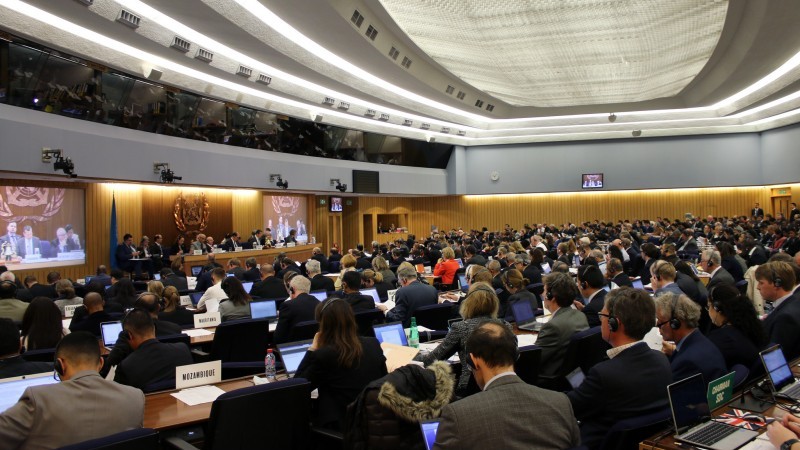The secretive world of UN shipping talks came under long overdue scrutiny for its delay and obstruction of climate action from mainstream media this week.
In a thorough piece of accountability journalism, the New York Times set out how industry dominates the International Maritime Organization (IMO), fighting any curbs on ship emissions and suppressing media coverage. I read it with mixed feelings.
On the one hand, I was delighted by the citation of Climate Home News’ deep coverage of the issue, which earned me a 2-year ban from the institution. On the other hand, that was five years ago. What took you so long?
In my experience of the IMO, it is not just the negotiating chamber that is overrepresented by business interests. The press gallery, too, is stacked with journalists from the trade press, whose readers are primarily concerned with what regulations will cost them. Perhaps one or two reporters from specialist environmental publications at debates on climate rules. Major news outlets are nowhere to be seen.
It might be hard to get a generalist editor interested in the complex workings of an obscure forum – credit to Matt Apuzzo and Sarah Hurtes for landing the pitch at NYT. But if the IMO continues with its lax approach to maritime emissions while nation states decarbonise, shipping’s carbon footprint will increasingly stick out. Journalists around the world can empower their readers, as consumers and citizens, to demand better.
Now is as good a time as any to pay attention. US president Joe Biden has picked candidates with climate credentials for key cabinet roles. Will he do the same for the vacant position of Maritime Administrator?
US, Denmark and Norway are leading a push for innovation in zero carbon shipping. How much money will they put on the table? And will they work with the IMO’s $5 billion Maritime Research Fund, as industry wants, or around it?
Adopting new clean technology is expensive, particularly if there is no price on pollution. Will governments that are vocal for climate action in other forums back the Marshall Islands’ call for a robust carbon tax on ship fuel? The small island, big ocean state has been left isolated in its struggle against powerful interests for too long.
These are the questions we are asking ahead of the IMO environmental committee meeting starting next Thursday. Sign up to our daily newsletter to get the answers first.
This week’s news…
- UK calls on Indonesia to set out roadmap to net zero emissions
- NASA launches mission to better predict climate impacts
- Lost to sea: The Ivory Coast villagers saving their ancestors from rising waves
…and comment
- All hands on deck! We must use online tools to make climate talks more inclusive – Inès Bakhtaoui, SEI
- Why Denmark and Guinea are working together to tackle climate loss and damage – Oye Guilavogui, Flemming Møller Mortensen and Birgitte Qvist-Sørensen
